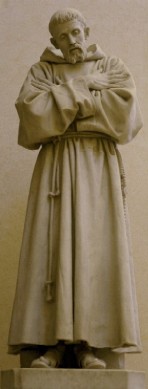
August 2nd, is the day of the Portiuncula Indulgence. Although this started at the Portiuncula in Assisi, the little church of Our Lady of the Angels (Santa Maria degli Angeli), the indulgence was eventually granted to all Catholic parishes around the world.
Deo gratias, I have been getting a lot of hits from searches for this already. Again, my motivation for posting this is to help the souls in Purgatory.
Indulgences still exist in the Church and are often much misunderstood not only by non-Catholics, but many Catholics as well.
1. An indulgence is the remission in the eyes of God of the temporal punishment due to sins whose culpable element has already been taken away. The Christian faithful who are rightly disposed and observe the definite, prescribed conditions gain this remission through the effective assistance of the Church, which, as the minister of redemption, authoritatively distributes and applies the treasury of the expiatory works of Christ and the Saints.-Handbook of Indulgences, Norms
The Catechism of the Catholic Church also treats this in #'s 1471 - 1479.
Anyway, to get to the details, one can obtain a plenary indulgence on August 2nd by visiting a parish church and doing the following:
- Devoutly carry out the indulgenced work and devoutly pray the required prayers (if there are any) that go along with the action. In this case, visiting a parish church and reciting the "Our Father" and the Creed.
- Say one “Our Father” and one “Hail Mary” for the intentions of the Pope on the day you perform the indulgenced work.
- Worthily receive Holy Communion, ideally on the same day on which you perform the indulgenced work or at least within a few days of performing the indulgenced work.
- Make a Sacramental Confession within a week of (before or after) the day on which you perform the indulgenced work.
- It is also required that one be free from all attachment to sin, even venial sin.
(Indulgences may be obtained for oneself or may be applied to the souls in Purgatory, but they may never be done for other living persons.)
As for the technical stuff, you can read the "Handbook of Indulgences" which is the current document of the Church for setting forth the guidlines and permitted indulgences.
“22. The prescribed work for gaining a plenary indulgence attached to a church or oratory is a devout visit there, which includes the recitation of the Lord’s Prayer and the Creed (Pater Noster and Credo), unless otherwise stated in a specific grant.”-Handbook of Indulgences, Norms
“23. 1. Besides the exclusion of all attachment to sin, even venial sin, the requirements for gaining a Plenary Indulgence are the performance of the indulgenced work and fulfillment of three conditions: Sacramental Confession, Eucharistic Communion, and prayer for the Pope’s intentions.
2. Several Plenary Indulgences may be gained on the basis of a single Sacramental Confession; only one may be gained, however, on the basis of a single Eucharistic Communion and prayer for the Pope’s intentions.
3. The three conditions may be carried out several days preceding or following performance of the prescribed work. But it is more fitting that the Communion and the prayer for the Pope’s intentions take place on the day the work is performed.
4. If a person is not fully disposed or if the prescribed work and the three mentioned conditions are not fulfilled, the Indulgence will only be partial ...”
5. The condition requiring prayer for the Pope’s intentions is satisfied by reciting once the Our Father and Hail Mary for his intentions (Pater Noster and Ave Maria); nevertheless all the faithful have the option of reciting any other prayer suited to their own piety and devotion.”
Please note how this helps one develop spiritual virtue: praying, going to Confession, receiving Holy Communion, praying for the pope, detaching oneself from sin, and if seeking an indulgence for a soul in purgatory, fraternal charity as well.
So how did this particular indulgence come about?
 A good description is found in Arnaldo Fortini's book "Francis of Assisi"
A good description is found in Arnaldo Fortini's book "Francis of Assisi"Portziuncola Pardon: 1216
[His] compassion for everyone, no matter what he was or what he had done, inspired the great Franciscan Indulgence of the Pardon. According to the story told by some of Francis's companions, the Indulgence was preceded by a miraculous vision in the Portziuncola chapel on a night of July 1216.
Francis was praying, kneeling before the altar, when an extremely bright light shown all about. In the great splendour Jesus and Mary appeared, with a multitude of radiant angels. They bade Francis ask for whatever he thought best for the salvation of human souls.
And Francis replied:
"Since it is a miserable sinner who speaks to you, O God of Mercy, he askes you to have mercy on his brothers who are burdened with sin. And he asks that all those who, prentant, cross over the threshold of this place, receive from you, O Lord, who sees their torment, pardon for their evil deeds."
His prayer would be answered, he was assured. However, the fulfillment of it would have to be sealed by the pope, the Vicar of Christ.
Then the divine light disappeared and the song of the angels faded away.
When the first rays of dawn broke through the small window crookedly cut into the wall at Porziuncola, Francis rose and called Brother Masseo, and together they set out for Perugia.
As for the rest,to make a long story short, the pope eventually granted his request in the form of a plenary indulgence, and since 1967, this same privilege is obtainable at every parish church on August 2nd.
This is also obtainable on the titular feast of a church as well with all the same requirements. So if your parish happens to be "Assumption Parish" then you can also obtain a plenary indulgence on August 15th, or if your parish is named for "Saint Luke's" then you can also obtain a plenary indulgence on October 15th, etc., by reverenly carrying out the above conditions.
And I always like to link to Fr. Tim Finigan's post on indulgences:
Plenary indulgences not impossible
RS






1 comment:
Thanks for the notice, and the link about plenary indulgences. I confess still having some nagging uncertainties about the latter -- not about what Fr. Finnigan is stating about the intended widespread availability of plenary indulgences (which makes sense), but rather about exactly what is meant by detachment from sin. It still seems kind of fuzzy to me
Post a Comment